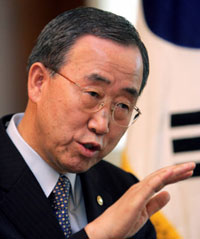Rescuers search for more bodies under UN office ruins in Algeria; death toll hits 31
Rescuers extracted the living and the dead from the ruins of the U.N. office in Algeria blasted by al-Qaida terrorists. Police officers, law students and U.N. employees from all over the world are among victims.

The Interior Ministry said 31 people were killed in Tuesday's twin truck bombings, as the official death toll slowly mounted Wednesday. Initial reports elsewhere had much higher figures, though the government insisted it had no reason to conceal the full tally,the AP reports.
Rescue work was focusing on five or six people who were in the basement of the U.N. building at the time of the attack and who could still be alive, said the chief of the emergency team, Djamal Khoudi.
Earlier Wednesday, seven survivors were pulled from beneath chunks of concrete, Khoudi said. One 40-year-old woman was transferred to a hospital where both her legs were amputated, he said.
The attacks - and their targeting of the United Nations - drew international condemnation. Islamic insurgents have been battling Algeria's government for 15 years, but have largely focused on symbols of Algeria's military-backed government and civilians. The other target of Tuesday's attack was Algeria's Constitutional Council.
U.N. Secretary-General Ban Ki-moon urged all nations on Wednesday to stand united against terrorism.
"In Algiers , we have today one more ugly reminder that terrorism remains the scourge of our times," he said. "The international community must be resolute in opposing those who prey on the innocent and vulnerable and those, like the United Nations, who seek only to help them."
"This attack on the U.N. is an attack on us all and our highest ideals," he said in a video address from Bali, Indonesia, to the 192-member General Assembly.
"Our mission has been, and will always be, to help those most in need," he said. "The Baghdad attack will not deter us. Neither will this most recent attack. Our colleagues in Algiers would ask no less."
It was the deadliest single attack against U.N. staff and facilities since August 2003, when the world body's headquarters in Baghdad was hit by a truck laden with explosives. That attack killed 22 people, including the top U.N. envoy, Sergio Vieira de Mello, and was blamed on a group that later affiliated with al-Qaida.
The United Nations provided a list Wednesday of nine staffers confirmed to have died in Algiers, including six Algerians, one Senegalese, one Dane and one citizen of the Philippines. A day earlier, the U.N. said 11 staff members had died. U.N. deputy spokeswoman Marie Okabe said Wednesday that was a preliminary figure and noted confusion at the scene.
The Interior Ministry said five of the dead were foreigners, including two people from China , and that three other foreign U.N. employees - two from China and one from Lebanon - were hospitalized.
Four police officers who were guarding the Constitutional Council also were among the dead, according to police at the site Wednesday.
Two law students were also killed, said law professor Rachid Ourari, choking back tears. "They were preparing for the bar," he said.
Pink-jacketed emergency workers delicately navigated the rubble at the U.N. offices while sniffer dogs scampered alongside. Families of the missing stood outside police cordons, waiting for news.
Workers for a private company housed in the building tried to save documents and computer equipment.
Police helicopters circled overhead, moving from the old port section of town to the tony neighborhood where the U.N. offices and Constitutional Council were targeted.
Residents of Algiers gathered around newspaper kiosks Wednesday, some expressing surprise the official death toll was so much lower than that reported elsewhere.
A national official at the civil protection agency said Wednesday that 45 people were killed. Soon after the bombings, a doctor said at least 60 were killed, and Algeria's independent daily El Watan reported up to 72 killed and 200 wounded.
A major Algerian hospital held a blood drive Wednesday, and dozens of people lined up to give blood.
"Algerians are completely united against terrorism," Algerian Foreign Minister Mourad Medelci said on France's Europe-1 radio, insisting the attacks did not portend "civil war."
Asked about the possibility of attacks elsewhere in North Africa, he said: "It's everyone who is targeted, sooner or later."
Ban Ki-moon called for an immediate review of U.N. security.
The U.N. offices are in the upscale Hydra neighborhood of Algiers, which houses many foreign embassies. The U.S. and British embassies stepped up security warnings. The French Embassy said that though violence had largely died down in recent years, "recent attacks show that it is time for a return to the most extreme prudence."
"The renewed threat by al-Qaida against French interests in North Africa cannot be ignored," the embassy said on its Web site.
Al-Qaida has called for attacks on French and Spanish interests in North Africa .
Saudi King Abdullah told Algerian President Abdelaziz Bouteflika the "terrorist acts will only increase the determination of the Algerian government and the people to uproot terrorism and eliminate it," the official Saudi Press Agency reported.
Al-Qaida's self-styled North African branch claimed responsibility in a posting on a militant Web site. Al-Qaida in Islamic North Africa - formerly known as the Salafist Group for Call and Combat - described the U.N. offices as "the headquarters of the international infidels' den."
Algeria's insurgency broke out in the early 1990s, when the army canceled the second round of the country's first multiparty elections to prevent likely victory by an Islamic fundamentalist party. Islamist armed groups then turned to force to overthrow the government, with up to 200,000 people killed in the ensuing violence.
Subscribe to Pravda.Ru Telegram channel, Facebook, RSS!


